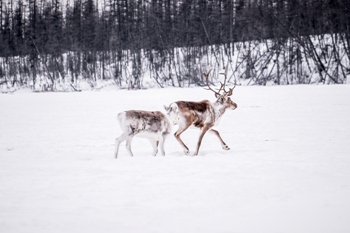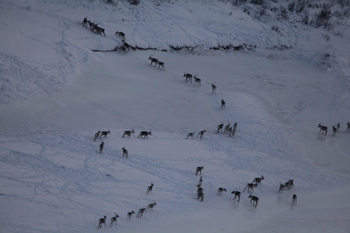Please activate JavaScript in your browser to use all interface options.
Supported by Rosneft, Vast Expedition Conducted to Study Reindeer
31 March 2021
Biologists of the Siberian Federal University (SFU) conducted a large-scale expedition in the north of the Krasnoyarsk Territory to study migration routes and the state of the key species population - wild reindeer, which is a bioindicator of the Arctic zone. The project was implemented with the support of Rosneft Oil Company and the Arctic Research Centre (the Company’s scientific institute) under the scope of the Ecology national project, together with the Ministry of Natural Resources and the Environment of the Russian Federation.
Environment protection is an integral part of the Company’s corporate culture and operation principles. In the field of conservation, the Company sees its main task in the effective management and minimisation of the impact of its manufacturing activity on the environment and in the conservation of biological diversity in all regions of its presence.
Wild reindeer are the backbone of the entire ecosystem of the Arctic North. Since 2014, Rosneft and its subsidiary Vostsibneftegaz have been supporting research on the migration of wild reindeer in the Evenki and Taimyr districts of Krasnoyarsk Territory. The use of collars with the ARGOS satellite monitoring system and integral GPS receivers made it possible to obtain data about the animals’ full-year cycle of migration and to reveal the seasonal patterns of their movement, depending on weather conditions and other habitat factors.
 The field work related to the completed expedition took place in the close proximity of the migration routes and wintering grounds of the Taimyr-Evenki reindeer population - vicinities of the lakes Essey and Eromo of the Evenki municipal region. As part of the study, the largest integrated monitoring of animals in the history of the project was organised. During ground and aviation surveys, photo surveying and video recording were carried out with the subsequent identification of individuals, registration of human-induced disturbance places on the herd, collection of biological material samples, shooting from satellite and unmanned aerial vehicle for detailed examination of detected groups of animals.
The field work related to the completed expedition took place in the close proximity of the migration routes and wintering grounds of the Taimyr-Evenki reindeer population - vicinities of the lakes Essey and Eromo of the Evenki municipal region. As part of the study, the largest integrated monitoring of animals in the history of the project was organised. During ground and aviation surveys, photo surveying and video recording were carried out with the subsequent identification of individuals, registration of human-induced disturbance places on the herd, collection of biological material samples, shooting from satellite and unmanned aerial vehicle for detailed examination of detected groups of animals.
Nine deers are marked with satellite tags - radio beacons with integral ARGOS / GPS system. They will become markers of reindeer herds. It allows to track the complete migration cycle continuously. Signals about the location and movement of animals are sent to the data processing centre day and night, then to the computers of the SibFU scientists. Among daily images from space, movement tracks of tagged individuals will help to create maps, reflecting total path, direction, length and intensity of herd movement, taking into account weather activity and range condition.
According to experts, over the past 20 years, the Taimyr-Evenki group of wild deer has decreased from 1 million individuals to 400 thousand. Given this downward trend, a particularly important task today is to develop methodological approaches to the conservation of biological diversity of the Russian Arctic. Identification of migration routes of wild reindeer is a key to this task. Contemporary science does not yet know what determines the length of stay of reindeer in traditional calving grounds. Today it averages 63 days, which is a third as many than in the 1960s.
The analyses obtained during the study will allow biologists to identify trends and strategies of movement, as well as the state of the population as a whole.
Note for Editors:
In 2020, Rosneft and the Ministry of Natural Resources and the Environment of the Russian Federation signed the Cooperation Agreement within a frame of the Ecology national project. According to the agreement, Rosneft and the Ministry are developing cooperation in biological diversity preservation. Particularly, Rosneft is implementing the corporate programme of research, conservation and monitoring of key species indicating the sustainability of the Arctic ecosystems, which are polar bear, Atlantic walrus, wild reindeer and ivory gull, the rare gull subspecies listed in the Red Book of the Russian Federation.
Comprehensive field studies are conducted within the programme, providing up-to-date information about the state of the populations living in the Arctic zone of the Russian Federation and their migration routes.
Rosneft
Information Division
March 31, 2021

-315xx70.png)

